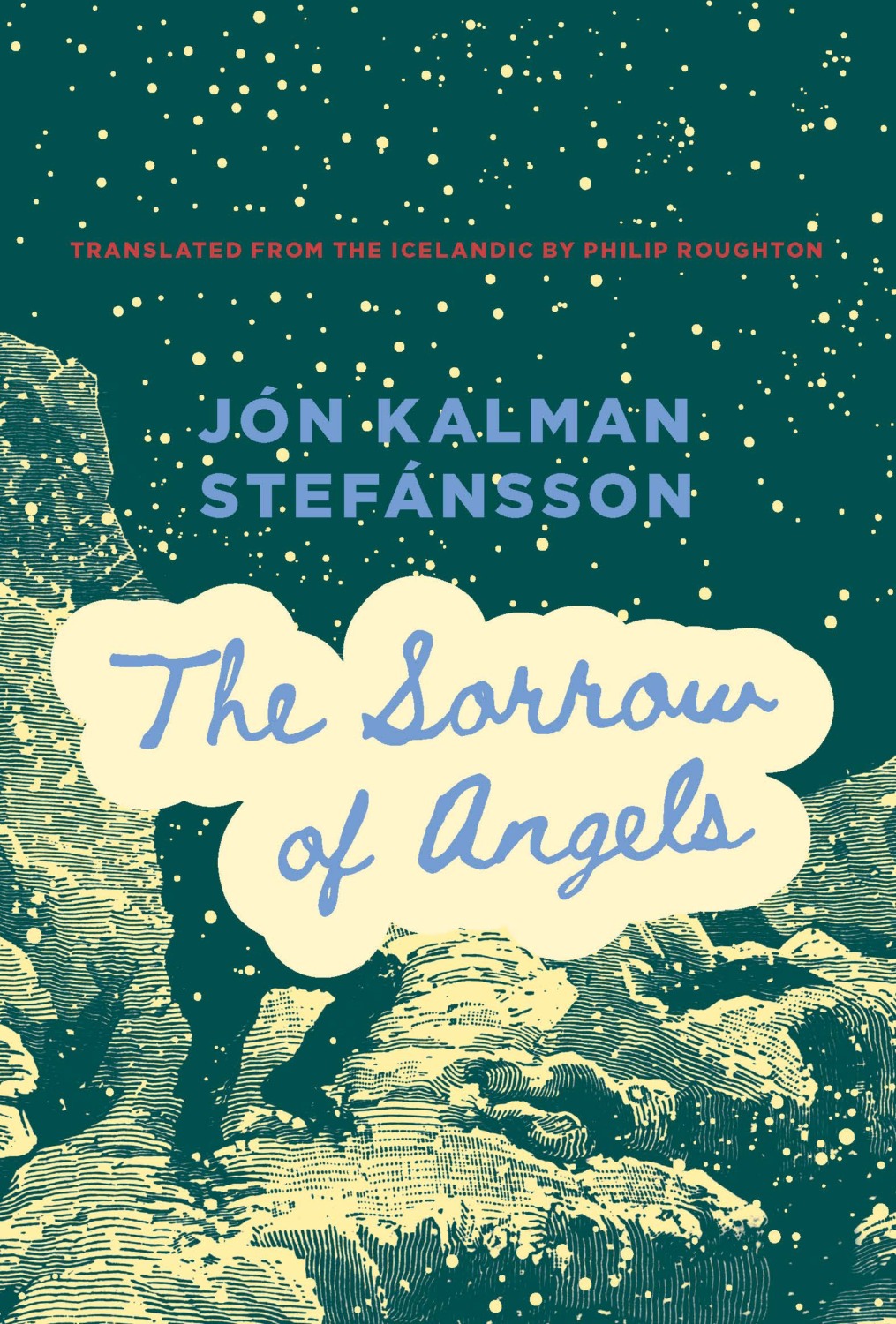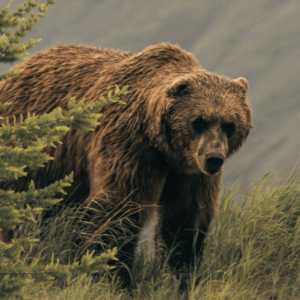Somewhere within the murky snowfall and frost, evening is falling, and the April darkness squeezes between snowflakes that pile up on the man and the two horses. Everything is white with snow and ice, yet spring is on its way. They toil against the north wind, which is stronger than everything else in this country, the man leans forward on the horse, holds tightly to the other’s reins, they’re completely white and icy and are likely about to change into snow, the north wind intends to gather them before the arrival of spring. The horses trudge through the deep snow, the trailing one with an indistinct hump on its back, a trunk, stock-fish or two corpses and the darkness deepens, yet without turning pitch black, it’s April, despite everything, and they press on from the admirable or torpid obstinacy that characterises those who live on the border of the habitable world. It’s certainly always tempting to give up, and in fact many do so, let everyday life snow them over until they’re stuck, no further adventures, simply stop and let themselves be snowed over in the hope that sometime it will stop snowing and clear skies will return. But the horses and the rider continue to resist, press on despite the seeming existence of nothing in this world except for this weather, everything else is gone, such snowfall wipes out directions, the landscape, yet high mountains are hidden within the snow, the same ones that take a considerable portion of the sky from us, even on the best days when everything is blue and transparent, when there are birds, flowers, and possibly sunshine. They don’t even lift their heads when a house gable suddenly appears in front of them from out of the relentless snowstorm. Soon another gable appears. Then a third. And a fourth. But they fumble along as if no life, no warmth has anything to do with them any longer and nothing matters except for their mechanical movement, faint lights can even be glimpsed between the snowflakes, and lights are a message from life. The trio has come up to a large house, the mounted horse moves all the way up to the steps, lifts its right foreleg and scrapes vigorously at the lowest one, the man grunts something and the horse stops, then they wait. The lead horse is upright, tense, its ears perked, while the other hangs its head, as if thinking deeply, horses think many things and are the closest of all animals to philosophers.
Finally the door opens and someone steps out onto the landing, his eyes squinting into the obtrusive snowfall, his face drawn against the ice-cold wind, the weather controls everything here, it models our lives like clay. Who’s there? he asks loudly and looks down, the blowing snow sunders his line of sight, but neither the rider nor the horses reply, they just stare back and wait, including the horse standing behind with the hump on its back. The person on the landing shuts the door, feels his way down the steps, stops just over halfway down, thrusts out his chin to see better before the rider finally makes a hoarse and rattling sound, as if clearing ice and muck from his language, opens his mouth and asks: Who the Hell are you?
The boy steps back, up one step, I really don’t know, he replies with the sincerity that he hasn’t yet lost, and which makes him a fool or a sage: No-one special, I suppose.
Who’s out there? asks Kolbeinn, the old skipper, who sits hunched over his empty coffee cup and directs the broken mirrors of his soul towards the boy, who has re-entered and wants more than anything to say nothing, but still blurts out, Postman Jens on an ice horse, he wants to talk to Helga, before hurrying past the skipper, who sits in his eternal darkness.
The boy quickly ascends the interior staircase, rushes into the corridor and clears the steps to the garret in three leaps. Gives himself entirely to the race, shoots like a phantom up through the opening and then stands panting in the garret, completely motionless, while his eyes become accustomed to the change of light. It’s nearly dark there; a little oil lamp stands on the floor and a bathtub appears against a window full of snow and evening, shadows flicker about the ceiling and it’s as if he’s in a dream. He discerns Geirþrúður’s coal-black hair, white shoulder, high cheekbones, half a breast and drops of water on her skin. He spies Helga next to the bathtub, with one hand on her hip, a lock of hair has come loose and falls across her forehead, he’s never seen her so carefree before. The boy jerks his head as if to wake himself, turns around abruptly and looks the other way, even though there’s nothing special to see besides darkness and emptiness, which is where a living eye should never look. Postman Jens, he says, and tries not to let his heartbeat disturb his voice, which is of course entirely hopeless: Postman Jens has come, and he’s asking for Helga. It’s perfectly safe for you to turn around, or am I so ugly? says Geirþrúður. Stop tormenting the boy, says Helga. What can it hurt him to see an old woman naked? says Geirþrúður, and the boy hears her stand up from the bath. People get in the bathtub, think something, bathe themselves and then stand up from the bathwater, all of this is rather ordinary, but even the most ordinary thing in this world can conceal considerable danger.
Helga: It’s safe for you to turn around now.
Geirþrúður has wrapped a large towel around herself but her shoulders are still bare and her December-dark hair is wet and wild and possibly blacker than it’s ever been. The sky is old, not you, says the boy, and then Geirþrúður laughs quietly, deep laughter, and says, you’ll be dangerous, boy, if you lose your innocence.
*
Kolbeinn grunts when he hears Helga and the boy approaching, contorts his face, which is covered with lines and deep grooves from the lashes of life and his right hand moves slowly across the table, feels its way forward like a weak-sighted dog, pushes aside the empty coffee cup and glides over the cover of a book before his expression slackens suddenly, fiction doesn’t make us modest, but sincere, that’s its nature and that’s why it can be an important power. Kolbeinn’s expression hardens when the boy and Helga enter the Café, but he continues to rest his hand on the book, Othello, in the translation of Matthías Jochumsson. “Be still, hands! Both you, my men and the rest; were it my task to fight, I could perform it without prompting.” Helga had thrown on a thick, blue shawl; she and the boy walk past Kolbeinn, who pretends not to be interested in anything, and then they’re outside. Helga looks down at Jens and the horses, all three nearly unrecognisable, white and icy. Why don’t you come in, man? she asks, somewhat sharply. Jens looks up at her and says apologetically: To tell the truth, I’m frozen to the horse.
Jens generally chooses his words carefully, and is, what’s more, particularly reticent just after finishing a long and difficult winter delivery trip; what’s a person supposed to do with words in a blizzard anyway, up on a stormy heath and all directions lost? And when he says that he’s frozen to the horse, he means it; then the words are completely transparent and hide no meanings, no shadows, as words are wont to do. I’m frozen fast to the horse: which means that the last large stream that he crossed, around three hours ago, concealed its depth in the darkness of the storm; Jens was soaked from his knees down yet the horse is tall, the April frost clamped around them in a second, horse and man froze together so tightly that Jens couldn’t move a muscle, couldn’t dismount and had to let the horse scrape at the lowest step in order to announce their arrival.
Helga and the boy have to work hard to pull Jens off the horse and then assist him up the steps, which is no easy task, the man is big, around a hundred kilos, no doubt; Helga’s thick shawl has turned white with snow by the time they manage to get Jens off the horse, and there are still the steps. Jens snorts angrily; the frost has deprived him of his virility and transformed him into a helpless old man. They plod up the steps. Helga once wrestled down a drunk fisherman in the Café, a man of above-average size, and then threw him out like a piece of rubbish; Jens thus transfers most of his weight automatically to her; who is this kid, by the way? There doesn’t seem to be much to him, he could break beneath snowflakes, let alone a heavy arm. The horses, Jens mutters on the fifth step; yes yes, replies Helga simply. I was frozen fast to the horse and can’t walk unsupported, says Jens to Kolbeinn as Helga and the boy half carry, half drag him in. Take the trunks off the horse, says Helga to the boy, I’ll handle Jens myself from here on; then take the horses to Jóhann, you should know the way, and then let Skúli know that Jens is here. Can this one manage the trunks and the horses? asks Jens doubtfully, glancing sidelong at the boy; he’s more useful than he looks, is Helga’s only reply, and the boy carries the trunk into the house with difficulty, dresses warmly and heads out into the darkening night and gloomy weather with two exhausted horses.
__________________________________
From The Sorrow of Angels by Jón Kalman Stefánsson (translated by Philip Roughton). Copyright © Jón Kalman Stefánsson, 2009. Translation copyright © Philip Roughton, 2013. Reprinted with permission from Biblioasis.













